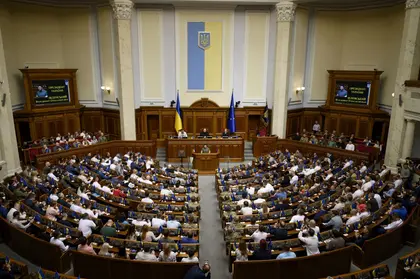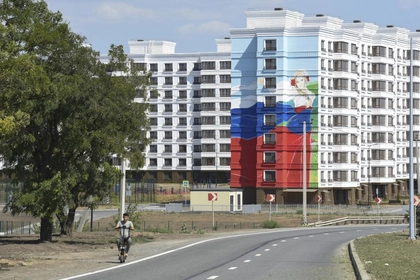According to a new poll, 78 percent of Ukrainians believe President Volodymyr Zelensky is directly responsible for corruption in the government and military.
This isn’t to say that Zelensky himself is corrupt, but rather, that if he appoints an official who turns out to be corrupt, then, it’s on him to fix the situation.
JOIN US ON TELEGRAM
Follow our coverage of the war on the @Kyivpost_official.
Meanwhile, a little over half of Ukrainians say aid to Ukraine should be contingent on Ukraine’s effectiveness in fighting corruption.
The public survey, conducted from July 3-17 and from Aug. 9-15, was carried out by two Ukrainian think tanks, the Ilko Kucheriv Democratic Initiatives Foundation, Razumkov Centre, in partnership with the Kyiv International Institute of Sociology.
This opinion poll spurred high-level discussions among politicians and public activists.
Davyd Arakhamia, who heads the parliamentary faction of the Servant of the People party, which is Zelensky’s party, called the poll “manipulative.”
“Not only is the president of Ukraine engaged in war and the search for help around the clock, he also has to replace the entire anti-corruption vertical, on which the country and partners spent billions,” he wrote in Telegram.
The survey question that seemed to gather the most criticism was: “Do you agree with the statement that the president is directly responsible for corruption in the government, military administrations?”

Ukraine’s Usyk Beats Fury in Heavyweight Championship Rematch
Minister of Digital Transformation Mykhailo Fedorov, who said he is a sociologist by education called the survey a “targeted attack.”
“Why is the answer to the question about responsibility for corruption only aimed at the president? What would be the results of a survey with the question ‘Who is responsible for corruption?’ and which had different answer options?’” Federov asked in a Facebook post.
But Daria Kaleniuk, the co-founder and executive director of the Anti-Corruption Centre, said that with these statements, government officials demonstrate that they are resistant to accepting “uncomfortable sociology.”
“The longer the president continues to appoint people to the most important positions in the country based on the principle of loyalty to himself and devotion to [Head of the President's Office] Andriy Yermak – the more Zelensky will concentrate public dissatisfaction in the fight against corruption on himself,” the activist said.
“And sociologists are not to blame for this. They, like doctors, diagnose. Whether to be treated or not is the patient's decision. The diagnosis will not change whether the patient likes it or not,” Kaleniuk said.
The survey
Petro Burkovsky, executive director of the Ilko Kucheriv Democratic Initiatives Foundation, told Kyiv Post that the idea to conduct the survey arose in the spring.
“Back at the beginning of this year, around March, we conducted research on how national memory is formed and saw that when the topic of corruption in Ukraine is raised, people are deeply concerned. It was an indicator that something was happening. We decided to look and find out what people were concerned about, and what should be done about this phenomenon – how to react.”
So, in July, sociologists asked respondents questions to see whether people agreed or disagreed with who bears responsibility for corruption in the country and what should be done. They also attempted to gauge how society reacts to criticism – both from within the country and from abroad – about Ukrainian officials being corrupt.
The results of the polls made it clear that the president, as commander-in-chief, is seen as the person who’s ultimately held accountable for the government’s actions, Burkovsky said.
This is a signal to the president and his team that it’s necessary to change how it handles matters involving personnel, Burkovsky said.
Although Zelensky has the highest trust rating in modern Ukraine’s history, with 86 percent of citizens considering him to be an effective Commander-in-Chief – corruption concerns remain, Burkovsky said.
On Sept. 3 – in the wake of corruption scandals involving the defense department – Zelensky announced that his defense minister, Oleksiy Reznikov would be stepping down. He said that Kyiv would be looking at “new approaches.”
While Reznikov was not directly implicated, Reznikov’s resignation came after Ministry of Defense scandals during his time in office.
In January, investigative journalists from the Ukrainian news outlet, Dzerkalo Tyzhnia (Mirror of the Week), had run a story revealing that a military supplier was charging the government nearly 2 ½ times the retail rate for eggs.
Following the Dzerkalo Tyzhnia story, journalists from Radio Free Europe / Radio Liberty, identified at least four additional major contractors who had charged the Defense Ministry above-market rates for food provisions.
And on Aug. 10, Dzerkalo Tyzhnia ran another story reporting that the defense department had procured 4,900 summer jackets from a Turkish company for $142,000 – and then reported them being worth $421,000.
“If there is no explanation, all the negativity that is there will fall exclusively on the president,” Burkovsky said, “…our president is a symbol of the fight against Russia, a symbol of our resistance.”
“Corruption, corruption crimes that are committed, or suspicions that are expressed about officials of various levels, but who in one way or another belong to the vertical of power – it will negatively affect the confidence and support of the president,” he said.
When asked why Zelensky seemed to be singled out in the survey, he said that this was due to martial law being in effect.
“All ministers and the entire vertical of military administrations are subordinate to him – these are the people whom he appoints and dismisses,” he said.
While this is true, it’s worth noting that the president’s office must still receive parliamentary support for its chosen candidates.
How big a problem is corruption in Ukraine?
Talks about the high level of corruption in Ukraine have been going on for many years and Ukraine's international partners have repeatedly helped Kyiv in its fight against corruption.
For this purpose, the National Anti-Corruption Bureau, the High Anti-Corruption Court, and the National Agency on Corruption Prevention (NAPC) were all created. And a variety of grants have been allocated to support sunshine initiatives in Ukraine.
Meanwhile, Russia attempts to weaponize the narrative about Ukrainian officials’ corruption in the international political arena – attempting to weaken Western support.
Lithuanian President Gitanas Nauseda said on Sept. 5 that corruption scandals can slow down weapons supply deliveries to Ukraine.
“Since those states that support Ukraine are democratic states, it means that they should take into account their society’s mood and their voters' opinion,” Nauseda said.
“Imagine the situation: voters in one of the states see that there are very visible corruption scandals in the aid-directed country. This is a huge reputational blow for this state,” he said.
That said, along with high-level moves by Kyiv to fight corruption, according to an NAPC survey, in their lives, Ukrainians say they’ve encountered less domestic corruption over the past four years.
Based on the survey, the level of exposure of the Ukrainian population to corrupt practices has decreased by almost 10 percent – from 26.5 percent to 17 percent. However, the perception of corruption remains five times higher.
According to the 2022 NAPC survey respondents found that Zelensky and his office are the most effective at fighting corruption, with law enforcement agencies in second place.
In a televised interview on Aug. 27, Zelensky equated corruption with “treason” and said that a bill would be prepared to help do that.
“I understand that such a weapon cannot be used in society all the time, but for wartime, I think it will help,” Zelensky said.
On Sept. 12, Zelensky stood against some members of his own party and vetoed a draft law that put off online reporting of government officials’ assets for a year.
Under pressure from Zelensky, on Sept. 20, Ukraine’s parliament, the Verkhovna Rada, ultimately voted to make assets declarations open to the public.
On Aug. 11, Zelensky announced the dismissal of the regional heads of all military commissariats following revelations of corruption amongst them taking bribes in exchanges for declaring potential draftees unfit for duty.
And along with the dismissal of Reznikov, Supreme Court Chairman Vsevolod Kniaziev was dismissed following a bribery scandal and replaced in May.
“There are no more untouchables in this country,” Supreme Court Chair Stanislav Kravchenko told Kyiv Post in a Sept. 2 interview.
On Western aid
In the survey, Ukrainians were also asked “Whether it would be appropriate for foreign partners to introduce an approach under which military aid to Ukraine would be provided only under the condition of an effective fight against corruption.”
A total of 55 percent of respondents said it would be appropriate. But Burkovsky said that Ukrainians are not calling for reduced military aid.
Indeed, in some cases, their survival depends on it. But it does highlight Ukrainians’ thinking on corruption and aid.
“Western governments make decisions about providing weapons not because of what and how Ukrainians think. These decisions are made taking into account a whole set of factors, first of all, due to the awareness of the threat posed by Russia,” he told Kyiv Post.
Rather, the poll shows that Ukrainians have integrity, Burkovsky said.
“They are not ready to close their eyes to corruption even in the conditions of a terrible war,” he said.
“This is a very high indicator of the quality of Ukrainian society, its maturity. Our allies and partners can rely on Ukrainian society. Ukrainians are ready to fight and will not put up with crime, oppression of their rights and freedoms, and usurpation of power,” Burkovsky said.
You can also highlight the text and press Ctrl + Enter








